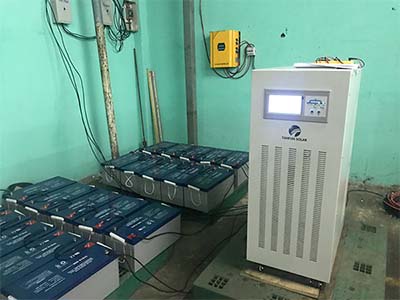 TANFON SOLAR
TANFON SOLAR
 January 14,2024
January 14,2024
Solar panels have become more than just an alternative energy source; they've evolved into a symbol of environmental responsibility and a practical solution for individuals and businesses alike. This growing interest in solar panels can be attributed to various factors, each playing a crucial role in shaping the appeal of harnessing the power of the sun.
Introduction
In today's world, where climate change is a pressing concern, and the need for sustainable practices is at its peak, solar panels have emerged as a beacon of hope. As the interest in renewable energy sources continues to rise, so does the curiosity surrounding solar panels.
Environmental Benefits
One of the primary reasons people are turning to solar panels is their significant environmental benefits. By harnessing the power of the sun, solar panels help reduce carbon footprints and contribute to mitigating climate change. The environmental impact is a key driver behind the surge in interest and adoption of solar energy solutions.
Cost Savings
While the initial investment in solar panels may seem daunting to some, the long-term cost savings are a major draw. As technology advances, the efficiency of solar panels improves, resulting in more substantial returns on the initial investment. Government incentives and rebates further sweeten the deal, making solar energy an economically viable option.
Energy Independence
In an era of fluctuating energy markets, the desire for energy independence is a compelling factor driving interest in solar panels. By decreasing reliance on traditional energy sources, individuals and businesses gain a sense of security, knowing that they have a consistent and sustainable energy supply.
Technological Advancements
Advancements in solar technology play a pivotal role in sustaining the interest of the masses. Ongoing innovations in solar panel design and increased efficiency contribute to making solar energy an attractive and competitive option in the energy landscape.
Residential Appeal
The appeal of solar panels extends beyond their environmental and economic benefits. Homeowners, in particular, are increasingly drawn to the idea of generating their own clean energy. The installation of solar panels not only reduces utility bills but also enhances the overall value of residential properties.
Commercial Applications
Businesses, too, are recognizing the economic benefits of adopting solar solutions. Beyond the positive environmental impact, incorporating solar panels into commercial structures proves economically advantageous, contributing to a company's bottom line and fostering a positive corporate image.
Government Initiatives
Supportive policies and regulations at the government level have further fueled the interest in solar panels. Incentives such as tax credits and rebates make the transition to solar energy more accessible and attractive to a broader audience.
Educational Outreach
Raising awareness about the benefits of solar energy is crucial in maintaining and growing public interest. Educational programs and initiatives aimed at dispelling myths and promoting the advantages of solar panels contribute significantly to the increasing adoption of this technology.
Social Influence
As trends in sustainable living gain momentum, social influence plays a vital role in driving interest in solar panels. Peer recommendations and a collective sense of social responsibility contribute to the widespread adoption of solar energy solutions.
Aesthetics and Integration
Solar panels are no longer just functional; they can also be aesthetically pleasing. The integration of solar panels into the design of buildings and landscapes showcases a commitment to sustainability without compromising on visual appeal.
Advancements in Storage Technology
Addressing the intermittency challenge of solar energy, advancements in storage technology, particularly in battery solutions, contribute to the reliability and efficiency of solar power systems.
Global Impact
The impact of solar panels extends beyond individual households and businesses. Solar energy plays a crucial role in meeting global energy needs and bridging the energy gap in developing countries, contributing to a more sustainable and equitable world.
Myths and Misconceptions
Despite the numerous benefits, there are common myths and misconceptions surrounding solar panels. Addressing these misunderstandings is essential in providing accurate information and encouraging informed decision-making.
Future Prospects
Looking ahead, the future of solar energy appears promising. Anticipated developments in solar technology, coupled with a growing global commitment to sustainability, position solar panels as a key player in the future of energy.
Conclusion
In conclusion, the increasing interest in solar panels can be attributed to a combination of environmental consciousness, economic advantages, technological advancements, and a growing sense of social responsibility. As solar technology continues to evolve, its role in shaping a sustainable and energy-efficient future becomes increasingly prominent.
FAQs
-
Are solar panels only suitable for residential use?
- No, solar panels have diverse applications, including commercial and industrial use.
- No, solar panels have diverse applications, including commercial and industrial use.
-
Do solar panels work on cloudy days?
- Yes, solar panels can still generate electricity on cloudy days, although at a reduced efficiency.
- Yes, solar panels can still generate electricity on cloudy days, although at a reduced efficiency.
-
What government incentives are available for adopting solar energy?
- Government incentives may include tax credits, rebates, and other financial support programs.
- Government incentives may include tax credits, rebates, and other financial support programs.
-
How do solar panels contribute to environmental conservation?
- Solar panels reduce reliance on fossil fuels, lowering carbon emissions and mitigating environmental damage.
- Solar panels reduce reliance on fossil fuels, lowering carbon emissions and mitigating environmental damage.
-
Can solar panels be installed on all types of roofs?
- In most cases, solar panels can be installed on various roof types, but a professional assessment is recommended.












